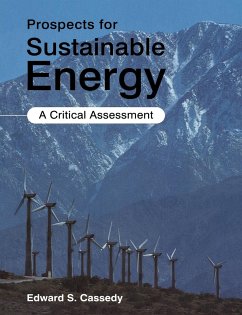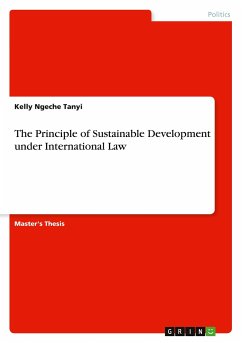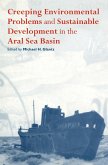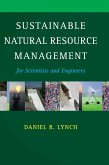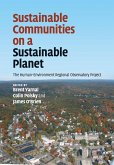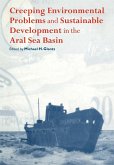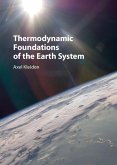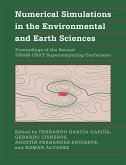Critical assessment of the complete range of sustainable energy technologies for policy-makers and advanced students.
Fossil fuels are a finite resource, and their continued use as the world's dominant energy supply is damaging the environment. Future use of alternative methods of energy supply is inescapable, and this book explores the historical origins, technical features, marketability, and environmental impacts of the complete range of sustainable energy technologies: solar, biomass, wind, hydropower, geothermal power, ocean-energy sources, solar-derived hydrogen fuel, and energy storage. The aim is to inform policy analysts and decision makers of the options available for sustainable energy production. The book is therefore written so as to be accessible to an audience from a broad range of backgrounds and scientific training. It will also be a valuable supplementary text for advanced courses in environmental studies, energy economics and policy, and engineering.
Review quote:
'This is a good introduction to the many sustainable (or alternative) energy technologies - It is clearly written and accessible to non-technical readers, and a useful reference for policy makers.' Mineral Planning
' - includes a great deal of interesting background information on various forms of energy conversion.' Nature
'The search for sustainable or renewable energy sources that can provide energy in abundance to replace fossil fuels and that are also environmentally sound is a perennial topic of interest - It is rare that one comes across a book on the subject such as this one by Edward Cassedy that actually lives up to its sub-title of 'a critical assessment' - This is an excellent book that presents a balanced and fair assessment of the state of sustainable energy as it exists today and which also looks at the changes that might accelerate their development into genuine alternatives to fossil fuels - Cassedy does inject a welcome and well-researched note of realism into the debate on sustainable energy.' Philip Barnes, The Journal of Energy Literature
'This book provides a comprehensive background and is a good reference and source book for both students and those working in the related fields of global energy needs and global climate impacts. It also provides useful detail for scientists involved in their government's fuel policy decisions. It would be useful to individuals or groups wishing to provide their own alternative energy source for environmental or geographic reasons. The book is well illustrated throughout. Valerie House, OUGS Journal
'- this book succeeds in highlighting often overlooked links - clearly show the authors' long practical experience of work in developing countries - readable and memorable book, amply justifying the authors' undiminished enthusiasm for their subject.' Experimental Agriculture
Table of contents:
Preface; Part I. Introduction: Part II. The Candidate Sustainable Technologies: Technological/Economic Assessments: 1. Solar energy sources; 2. Biomass energy; 3. Windpower; 4. Hydroelectric power; 5. Energy storage; 6. Geothermal energy; 7. Ocean energy; 8. Nuclear fusion; 9. Hydrogen fuel from renewable resources; 10. Summary assessment of the technologies; Part III. The Prospects for Technological Change Toward Sustainability: 11. Research development (RD); Appendix I. Energy cost analysis; Appendix II. Glossary of symbols; Appendix III. The conduct and management of research and development.
Hinweis: Dieser Artikel kann nur an eine deutsche Lieferadresse ausgeliefert werden.
Fossil fuels are a finite resource, and their continued use as the world's dominant energy supply is damaging the environment. Future use of alternative methods of energy supply is inescapable, and this book explores the historical origins, technical features, marketability, and environmental impacts of the complete range of sustainable energy technologies: solar, biomass, wind, hydropower, geothermal power, ocean-energy sources, solar-derived hydrogen fuel, and energy storage. The aim is to inform policy analysts and decision makers of the options available for sustainable energy production. The book is therefore written so as to be accessible to an audience from a broad range of backgrounds and scientific training. It will also be a valuable supplementary text for advanced courses in environmental studies, energy economics and policy, and engineering.
Review quote:
'This is a good introduction to the many sustainable (or alternative) energy technologies - It is clearly written and accessible to non-technical readers, and a useful reference for policy makers.' Mineral Planning
' - includes a great deal of interesting background information on various forms of energy conversion.' Nature
'The search for sustainable or renewable energy sources that can provide energy in abundance to replace fossil fuels and that are also environmentally sound is a perennial topic of interest - It is rare that one comes across a book on the subject such as this one by Edward Cassedy that actually lives up to its sub-title of 'a critical assessment' - This is an excellent book that presents a balanced and fair assessment of the state of sustainable energy as it exists today and which also looks at the changes that might accelerate their development into genuine alternatives to fossil fuels - Cassedy does inject a welcome and well-researched note of realism into the debate on sustainable energy.' Philip Barnes, The Journal of Energy Literature
'This book provides a comprehensive background and is a good reference and source book for both students and those working in the related fields of global energy needs and global climate impacts. It also provides useful detail for scientists involved in their government's fuel policy decisions. It would be useful to individuals or groups wishing to provide their own alternative energy source for environmental or geographic reasons. The book is well illustrated throughout. Valerie House, OUGS Journal
'- this book succeeds in highlighting often overlooked links - clearly show the authors' long practical experience of work in developing countries - readable and memorable book, amply justifying the authors' undiminished enthusiasm for their subject.' Experimental Agriculture
Table of contents:
Preface; Part I. Introduction: Part II. The Candidate Sustainable Technologies: Technological/Economic Assessments: 1. Solar energy sources; 2. Biomass energy; 3. Windpower; 4. Hydroelectric power; 5. Energy storage; 6. Geothermal energy; 7. Ocean energy; 8. Nuclear fusion; 9. Hydrogen fuel from renewable resources; 10. Summary assessment of the technologies; Part III. The Prospects for Technological Change Toward Sustainability: 11. Research development (RD); Appendix I. Energy cost analysis; Appendix II. Glossary of symbols; Appendix III. The conduct and management of research and development.
Hinweis: Dieser Artikel kann nur an eine deutsche Lieferadresse ausgeliefert werden.

